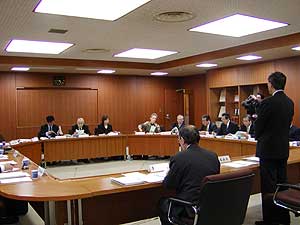| Movements Must Be Fundamentally Changed Nakabo and others Offer Suggestions at 1st Evaluatory Committee (29 March 2002) |
||
|
The first RENGO Evaluatory Committee Meeting was held on the 18th at the RENGO headquarters. The 3rd Central Executive Committee Meeting confirmed the establishment of this Evaluatory Committee as an organ to reflect outside voices in RENGO movements. Lawyer Nakabo (chairperson) and six other committee members unleashed their outspoken criticism. At the next meeting to be held on July 1, each committee member is expected to bring concrete plans with them in order to help improve RENGO's movements.
President Sasamori stated in his opening remarks, "If we do not develop more appealing labor movements we will not be able to attract people." His remarks on the strengthening and expanding unions also emphasized a need to review the nature of movements until this time. He then requested their positive feedback by asking for, "your frank opinions and advice not to score the activities until now, but rather look at what sort of movements are required from here on out and what RENGO should do for them." The seven committee members responded to this from a common point of view, that is that 'movements must be fundamentally changed,' and offered their various opinions respectively. Some of the suggestions included the following comments: "It is necessary to have a point of view, 'network communities' which unionize workers of a new generation." "I wonder whether the language of labor unions really gets through to people who have never experienced labor activities?" "RENGO must clarify what will be gained through strengthening and expanding the organizations." Sasamori responded to the committee's tough advice by expressing how difficult organizational management was saying, "The organization has gotten too large and it will take some time to make decisions." Moreover, he clarified the need to review the "three-tiered structure" that consists of unit unions, affiliated organizations, and RENGO, and the need to define each of their roles. Finally, Chairperson Nakabo rounded up the discussions and concluded the proceedings of the first meeting by asking each member to bring their concrete plans for changing RENGO movements with them to the next meeting (to be held on July 1). The Evaluatory Committee consists of the following seven members. Mari Osawa (Professor, Institute of Social Science, University of Tokyo), Naohiko Jinno (Faculty of Economics, the University of Tokyo), Jitsuro Terashima (Japan Research Institute Chairman), Kohei Nakabo (Lawyer), Nagaharu Hayabusa (Representative, Global Citizen Journalist Factory), Edith Hanson (Special Counsel to the Amnesty International Japan), Michiko Yoshinaga (writer). |
